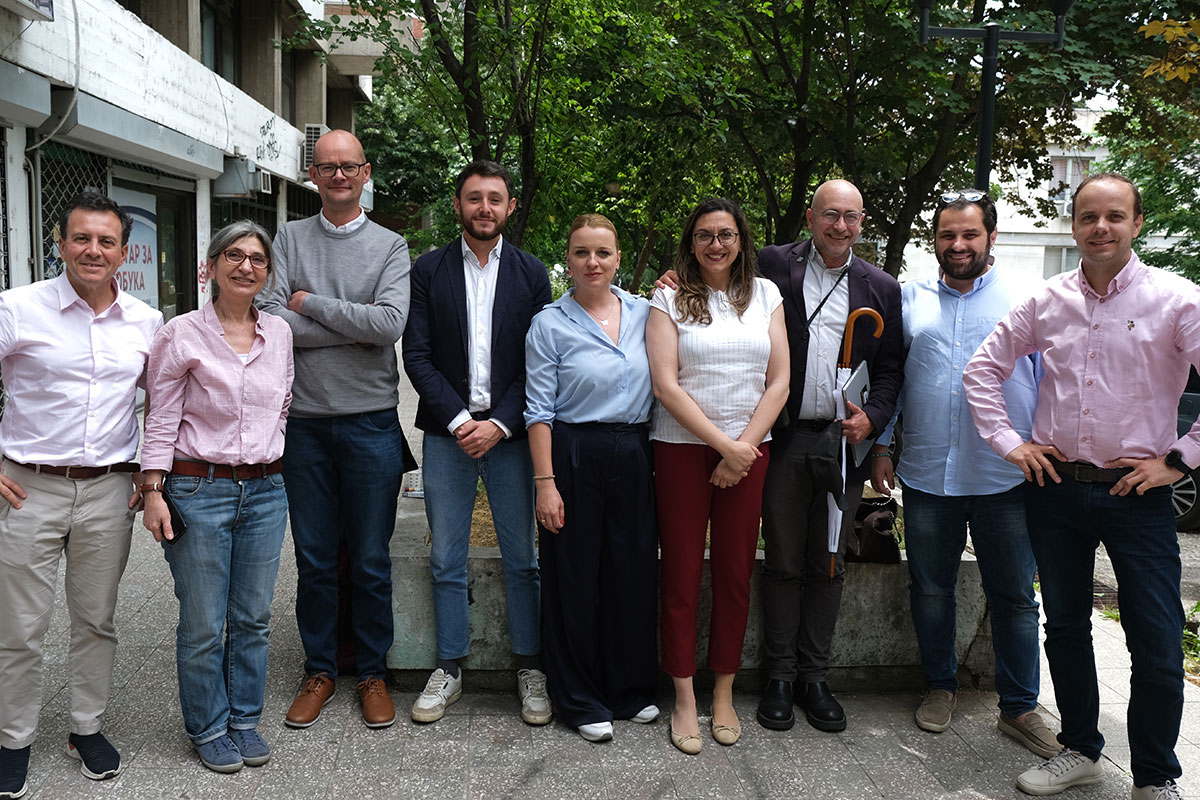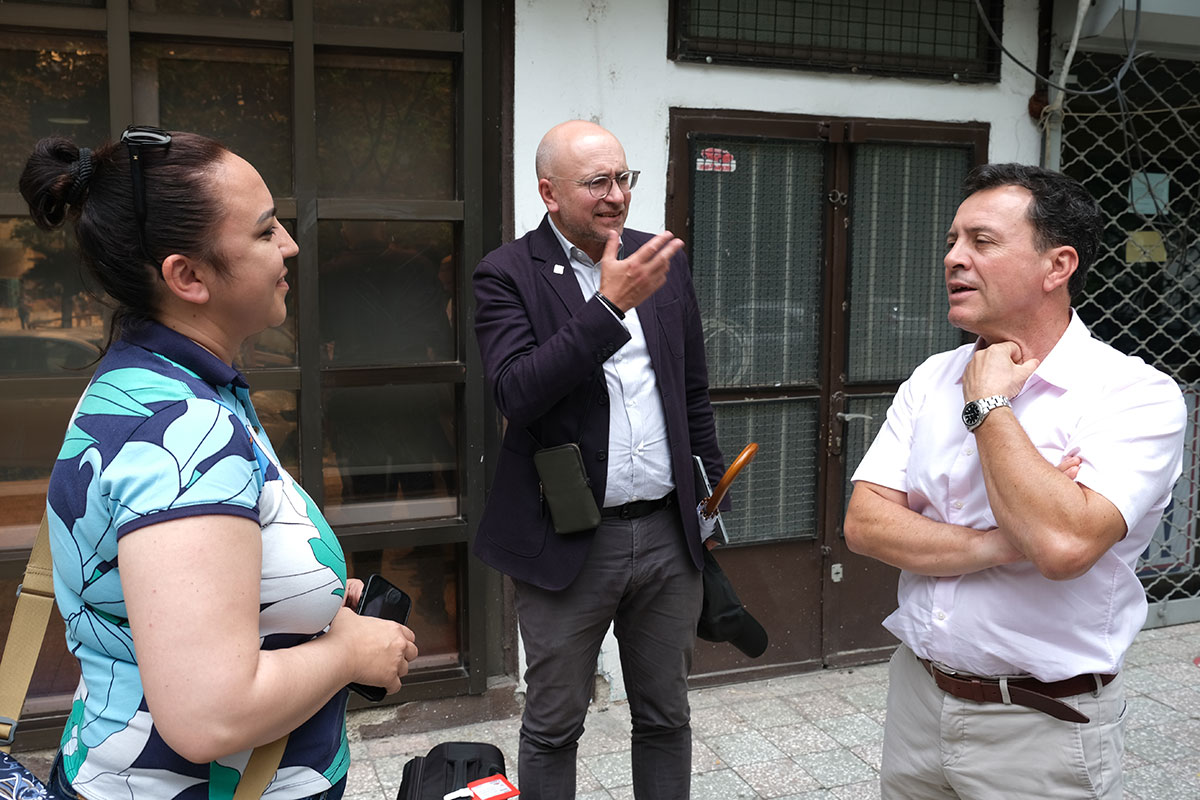"It is better than 10 years ago, but the situation with journalism in North Macedonia is still very worrying. Exactly 20 minutes before leaving for the international airport in Skopje, the Director of the largest journalistic organization in Europe (EFJ), Ricardo Gutierrez, told ResPublika his impressions of his several-day visit to Macedonia and the meetings with his colleagues here, with politicians and directors of several institutions. These meetings took place within the framework of the "Fact Checking Mission" organized by the Association of Journalists of Macedonia (ZNM). The taxi was waiting for him at the premises of ZNM, a familiar ground for him, because he was here in 2013, 2015 and 2017. He knows the country, he knows the hardships and it seems that this is precisely why he says with concern that it is difficult to talk about journalism in Macedonia.
"I would say the landscape is a bit healthier than it used to be, now there are legal protections for journalists, but I'm still worried. I'm still worried, because I don't see from the politicians the recognition of the role of journalism as a profession, which is significant for a democracy."
How do the authorities here view journalism?
When we talked to Ministers, except maybe the President of the country, others talked to us about business. They consider the media and journalism as normal work as any other business. Like selling apples, for example. You know, it is a specific profession. It is necessary for a democracy to have a strong journalistic landscape. They do not seem to discern that role. This means that they do not undertake activities to support journalism, to support media companies. That is not the main point – you know – to support journalism and support civil rights. Supporting or promoting media freedom does not mean advancing the rights of journalists. It is about promoting the right of citizens to access information. So it is really related to citizens' rights.
What is your position on the government funded public campaigns in the media outlets?
The Prime Minister and the Minister of Information Society informed us about the new law that should enable the government to promote and pay for public campaigns in the media outlets. So that would be a way to fund media companies. But we are not completely satisfied with it. We are convinced that this proposal will not improve the quality of journalism. There are other ways, other options, if you really want to promote journalism and public service. Many countries are developing what we call funds for media pluralism, so that they fund public funds dedicated to supporting quality journalism, ethical journalism, diversity in the media, better journalism to serve society better, so that when we consider journalism as public good, it is normal to invest some public money in it. Even if it is provided by private companies. The journalism provided by your private company is a public service.
We all need a balance between large broadcasters and private media outlets so that we have a healthier ecosystem landscape. It is normal for the government to provide some funding. It is understandable. It should be done in a completely independent manner, meaning without any interference from politicians in allocation of funds and it should be based on very objective criteria.

Does this practice already exist in some developed countries?
Many countries in Europe, like Belgium, France, the Netherlands... there are many countries that have similar means to support media diversity and to support journalists, not media companies.
What is your impression of the situation in the Broadcasting Service after the meeting with the management?
We were surprised to learn during our mission that only 17 journalists from the public broadcasting service cover the regions, and that all other journalists from the television are based in Skopje, and the 17 who are spread in the regions have service rendering contracts. They are freelancers. They work for all media outlets and do not have good working conditions. That is not normal.
Is Macedonia doing well in combating disinformation?
The media landscape in Macedonia is very polarized because society is very polarized. Disinformation is a problem and the best way to deal with this information is to support good journalism. If you respect the ethical rules and the main rule, which is the number one rule of ethical journalism - to respect the truth, to tell the truth – then you struggle with this information. So the best way to combat this information is to promote and support ethical quality journalism. I recognize the level of disinformation, and possibly the interference of foreign countries. The President of the country told us about the role of Chinese companies or Russian companies, supporting some of the "fans" of some media outlets in Macedonia.
I'm not a member of your security services, so I don't know if it's true or not. I believe him, but if it is true, the best way to solve that problem is to invest in good journalism, in ethical journalism.
A good way to combat this information is media literacy, help citizens discern for themselves and distinguish between reliable information and information that is biased because there are certain programs. So it is possible to do that and to educate people. That is the first point, and the second point is to promote ethical quality journalism.

Како да се мотивираат младите да ја работат оваа професија?
Малку сум загрижен со тоа што нема обновување на професијата. Мислам дека само девет студенти се запишале за следење на студии за комуникација и новинарство и ПР што е многу малку. Мислам дека тоа е поврзано со фактот дека јавните функционери не ја препознаваат улогата на новинарот во општеството. Не е привлечно за еден млад човек во Македонија да ја работи таа работа затоа што работата не е добро платена и не се признава. Тешко е, тешко е да се соочите со закани, заплашувања да ја завршите таа работа, некои други работи во областа на комуникацијата, на пример, се многу поудобни.
How to motivate young people to work in this profession?
I'm a little concerned with the lack of succession in this profession. I think only nine students enrolled to follow communication studies and journalism and PR, which is very few. I think it has to do with the fact that public officials do not recognize the role of the journalist in society. It is not attractive for a young man in Macedonia to do that job because the job is not well paid and not recognized. It is difficult, it is difficult to face threats, intimidation to do that work, some other things in the field of communication, for example, are much more comfortable.
Do you think artificial intelligence is a threat to the journalism profession?
I'm not afraid of it at all. If you look at the history of journalism, you will see that we have constantly faced technical revolutions. When radio was created it was the same fear that it would destroy the newspaper, then that television would destroy the radio and so on. As journalists we will use artificial intelligence to provide better journalism, journalists use social media to spread good quality information. These are tools, it depends on how you use them. We should not be afraid of technical technological revolutions.

